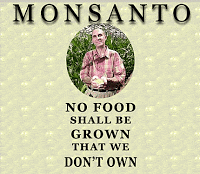Cassandra Anderson
Morph City
Last Friday a federal judge imposed a nationwide ban on GMO sugar beets and it was overturned the next business day. Sugar beets comprise 50% of the sugar used in US food, and 95% of the sugar beets grown in the US are GMO. It is the jurisdiction of the US Department of Agriculture to determine whether plants are environmentally safe; this case is about whether the plants can cross pollinate (by wind, insects, etc) and contaminate other plants. This could have cost Monsanto billions of dollars.
Less than 2 weeks ago, wild growing canola in North Dakota was discovered to be 86% GMO. Because GMO crops are crossed with herbicide resistant plants (usually weeds), they grow like weeds and contaminate natural plants. Alarmingly, two of the canola samples collected by scientists showed that multiple genes from different species of GMO canola plants cross pollinated without cultivation, and probably for several generations. The implication of this is that GMO seeds can readily contaminate natural seeds and become out of control.
The GMO alfalfa ban lawsuit about contamination was the first GMO case ever heard by the Supreme Court, despite countless lawsuits from farmers whose fields have been polluted by GMOs. The sugar beet ban was overturned, based on a Supreme Court decision (7-1), which lifted the nationwide ban on GMO alfalfa in June.


Be the first to comment on "Sugar Beets: Monsanto Wins Again"